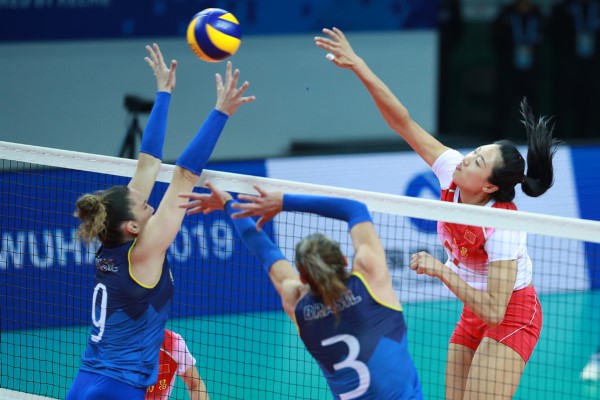

Bayi captain Liu Yanhan unleashes a spike during a group-stage victory over Brazil at the Military World Games in Wuhan, Hubei province, on Oct 17, 2019. The Chinese squad suffered a shock loss to the South Americans in the final. [Photo/Xinhua]
Bayi women's volleyball captain Liu Yanhan is putting China's final defeat to Brazil at the 7th Military World Games down to experience as she looks to learn from the chastening loss and nail down a place in the defending champion's roster for next year's Tokyo Olympics.
After beating the Brazilians in the
group stage, the Bayi squad was caught unawares by the South Americans' much-changed lineup in the final, losing 3-1 (25-23, 23-25, 25-23, 25-19) and ultimately having to settle for silver.
Still in the process of adapting to her new position as an opposite spiker in front of an expectant home crowd in Wuhan, the highly pressurized match was an intense but fortifying experience for captain Liu, both in terms of her individual play and as the team's leader.
"We had been looking forward to this match and prepared a lot for it. But losing points at crucial times when the match was tight affected our mentality and ultimately the entire match," Liu said.
"When facing a close rival after full preparation, we have to figure out how to bring out our full potential on the court. I think this is the problem we need to address after these Games."
Liu also captained a second-string national team at this year's Asian Women's Volleyball Championship in Seoul, where China took home bronze.
And although she admits the captaincy is challenging, it's a role she undoubtedly relishes.
"As the captain, you need to not only shoulder your responsibility as a player but you also have to motivate your teammates. It is a great psychological challenge, especially when you are struggling in the match, you have to stay energetic and play a leading role to fight for victory," the 26-year-old said.
"Off the court, you need to care for your teammates and study your opponents, so that when you encounter difficulties on the court, you know what the problem is and how to work it out."
Liu spent most of China's run to World Cup glory last month in Japan on the bench, however any game time she did have was in her new position as an opposite hitter, having previously played as a wing spiker.
"Coach Lang Ping asked me to get ready when I was off the court, so that when I was sent on, I could integrate into the team as quickly as possible," Liu explained.
"I'm not that familiar with opposite spiker compared to my original position. It involves more responsibility.
"For example, after a block, the first thing that comes to the mind of a wing spiker is to step back and get ready to fire an attack. But for an opposite spiker, you need to think more about defense. Coordinating with the setter is also important. Sometimes the passes are comfortable but sometimes not, so you need to deal with all of them.
"I have played this position before but in order to reach a higher level I still need more practice."
Liu says she is indebted to coach Lang's tutelage, who "every day in training sets an example" for the team.
"I learned from her to have a strong mentality and be devoted and attentive in training," said Liu.
Playing her way into Lang's 12-woman roster for Tokyo 2020 is now top of Liu's agenda, and she knows it won't be easy.
"I think it's normal to have fierce competition for places. It makes us better able to face the world's top players. As for me, I love playing volleyball and I have been trying to improve myself and catch up with them. I will pinpoint my weaknesses and try to fix them," Liu said.
"In a word, I will keep my eyes focused on my goal and fight for it."
Off the court, Liu, who can speak fluent English, has been enjoying her time at the Military Games. "I like communicating with players from other countries, learning new things about the sport and about different cultures," she added. "I find that's very interesting."